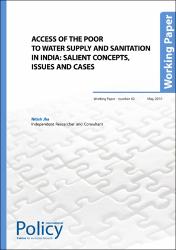Please use this identifier to cite or link to this item:
https://repositorio.ipea.gov.br/handle/11058/15111Full metadata record
| DC Field | Value | Language |
|---|---|---|
| dc.contributor.author | Jha, Nitish | |
| dc.date.accessioned | 2024-10-03T23:51:13Z | - |
| dc.date.available | 2024-10-03T23:51:13Z | - |
| dc.date.issued | 2010 | |
| dc.identifier.uri | https://repositorio.ipea.gov.br/handle/11058/15111 | - |
| dc.description.abstract | Access to safe water is necessary for lives and livelihoods. In India, a mid-term assessment reveals that the country has already met its MDG (Millennium Development Goal) in terms of expanding access to water infrastructure although in the parallel subsector of sanitation progress is falling far short of the mark. In reality, most basic observations indicate that water supply coverage is not as good as the figures show while national sanitation continues to be poor even after almost six decades of efforts to eradicate open defecation. It argues that economic, technical, institutional as well as social factors constrain access to safe drinking water and proper sanitation in India for both the urban and rural poor, and that coverage figures do not reflect this restricted access. It finds that, increasingly, communities are being required to manage their own water and sanitation schemes, not just in rural areas but in urban ones as well. There are definite advantages to such an institutional arrangement if the transition to community management is carried out smoothly. Often, however, the chances of success of community management are vitiated because policy makers misunderstand and misapply three interlinked concepts that are crucial to the success of community-managed water and sanitation schemes—participation; water and sanitation burden; and project ownership. The paper concludes by clarifying these concepts and the implications they have for policy implementation in this sector. | en |
| dc.language.iso | en | |
| dc.title | Access of the Poor to Water Supply and Sanitation in India: Salient Concepts, Issues and Cases | en |
| dc.type | Working Paper | |
| dc.rights.holder | International Policy Centre for Inclusive Growth | |
| dc.rights.holder | United Nations Development Programme | |
| dc.location.country | Brasil | |
| dc.description.physical | 40 p. : il. | |
| dc.rights.type | Licença total exclusiva | |
| dc.rights.license | O texto e dados desta publicação podem ser reproduzidos desde que as fontes sejam citadas. Reproduções com fins comerciais são proibidas. | |
| dc.subject.keyword | Access | |
| dc.subject.keyword | Poor | |
| dc.subject.keyword | Water Supply | |
| dc.subject.keyword | Sanitation | |
| dc.subject.keyword | India | |
| ipea.access.type | Acesso Aberto | |
| ipea.researchfields | N/A | |
| ipea.classification | Saneamento | |
| ipea.classification | Sociedade. Participação Social. Controle Social | |
| ipea.classification | Meio Ambiente. Recursos Naturais | |
| ipea.classification | Saúde | |
| Appears in Collections: | Publicações do IPC-IG | |
Files in This Item:
| File | Description | Size | Format | |
|---|---|---|---|---|
| en_IPCWorkingPaper62.pdf | 518.58 kB | Adobe PDF |  View/Open |
Items in DSpace are protected by copyright, with all rights reserved, unless otherwise indicated.

